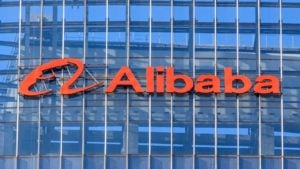The events were chronicled in the book, “The Big Short,” which was subsequently made into a movie of the same name that spread Burry’s fame even wider.
But Burry is a smart investor beyond his housing market call. His investment in GameStop (NYSE:GME) in 2019 unwittingly led to the meme stock frenzy surrounding the video game retailer.
Although he was not an “ape” who held on for dear life during its momentous ride in 2021, he reportedly made $250 million on his original $14 million investment.
While he closed Scion Capital in 2008, he now runs Scion Asset Management, a hedge fund that has over $103 million in assets under management.
Although subprime mortgages are making a comeback today under a new name, Burry isn’t betting against housing today, at least not yet. Instead, 26% of Scion’s portfolio is invested in the three Michael Burry stocks below. Let’s see if they should be in your portfolio, too.
JD.com (JD)

When everyone was fleeing Chinese stocks due to geopolitical tensions, Burry was rushing in. Beginning in the third quarter of 2023, as shares of JD.com (NASDAQ:JD) began their descent from $41 per share, Burry began buying them, scooping up 125,000 shares.
He added another 75,000 shares in the fourth quarter and bought 160,000 more in the first quarter of 2024, for a total of 360,000 shares.
While JD.com stock would end up falling as low as $22 a stub in mid-January, they soon began marching higher and hit $35 last month.
They’ve since fallen back to around $29 a share, which is in line with Burry’s average buy-in price of $29.53, putting him essentially at break-even.
JD.com is Burry’s biggest holding, accounting for 9.5% of Scion’s portfolio.
The Chinese e-commerce platform is in turnaround mode. JD.com was caught flat-footed by a sluggish economy and not focusing on its online retail business while upstarts like PDD Holdings‘ (NASDAQ:PDD) Temu took share with deep discount pricing.
JD responded with its own aggressive pricing and by dropping minimum order requirements for free delivery. The moves paid off. Its fourth-quarter earnings report easily beat analyst expectations as it drove tremendous traffic to its site again.
The e-commerce site also kicked off its annual 618 shopping extravaganza on May 31 with a theme of “quality and affordability.” It is the equivalent of Amazon‘s (NASDAQ:AMZN) Prime Day event but on steroids.
Analysts estimate JD sold around $60 billion worth of merchandise last year. Look for JD stock to rebound going forward.
Alibaba (BABA)

JD.com’s peer Alibaba (NYSE:BABA) is Burry’s second largest holding at $9 million, or 8.7% of Scion’s portfolio. It is clear the hedge fund operator sees a lot of opportunity from China’s biggest retailers.
Burry began buying BABA stock at the same time he picked up shares of its rival and he now owns 125,000 shares worth $9 million.
The stock has undergone a similar journey to JD.com and Burry’s average buy price is $80. Alibaba currently trades around $78 per share.
For many of the same reasons as JD.com, the outlook for Alibaba stock is just as bright. The Chinese government is supporting both consumers with new stimulus programs and companies by acting as a buyer of last resort for their stock.
Because China’s stock market doesn’t have circuit breakers like U.S. markets to minimize volatility, the government will step in and buy shares if they fall too hard too fast. It provides a floor of sorts for the stock, not that they can’t fall through it though.
Alibaba’s improved operations while also focusing again on its core e-commerce business, provides plenty of runway for future growth.
HCA Healthcare (HCA)

HCA Healthcare (NYSE:HCA) is one of the largest hospital chains in the U.S., with facilities all across the country, but with a special focus on New York and Florida.
Revenue and profits are moving higher for the hospital operator. First-quarter revenue jumped 11% to $17.3 billion while profits of $1.6 billion or $5.93 per share, were 22% higher. €‹ €‹
Same facility admissions increased 6.2% while same facility equivalent admissions increased 5.2%. Equally important, revenue per equivalent admissions was up 4% from the year ago period. Emergency room visits were 7% higher.
Burry established a new position in HCA Healthcare in the fourth quarter last year buying 20,000 shares and adding 5,000 more in the first quarter. The 25,000 total is worth $8.3 million, making it Burry’s third-largest holding at 8.1% of the portfolio’s total.
His average buy-in price is $267 per share, giving Burry gains of 26% on HCA Healthcare’s current price of $337 per share. There is no reason it can’t go higher as health care, especially hospital care, remains an essential service few will go without.
On the date of publication, Rich Duprey did not hold (either directly or indirectly) any positions in the securities mentioned in this article. The opinions expressed in this article are those of the writer, subject to the InvestorPlace.com Publishing Guidelines.
Rich Duprey has written about stocks and investing for the past 20 years. His articles have appeared on Nasdaq.com, The Motley Fool, and Yahoo! Finance, and he has been referenced by U.S. and international publications, including MarketWatch, Financial Times, Forbes, Fast Company, USA Today, Milwaukee Journal Sentinel, Cheddar News, The Boston Globe, L’Express, and numerous other news outlets.
